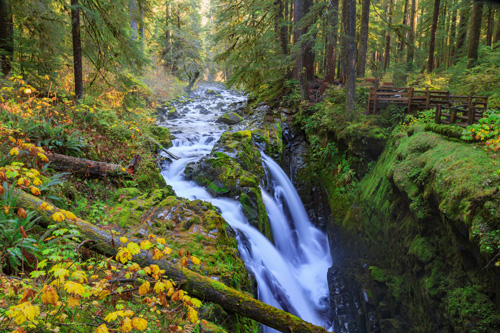
Watersheds and Rivers are Inseparable
January 15th, 2017 Posted by rkstoll chinook, Fishing, rivers 0 thoughts on “Watersheds and Rivers are Inseparable”“There is no final ecological truth. All knowledge is a current approximation, and each addition to that knowledge is but a small, incremental step toward understanding. Not only are ecosystems more complex than we think; they are more complex than we can think.”
Jack Ward Thomas, 1992.
We could feel the dampness of spring lingering in the early morning hours, two, maybe three weeks after the passing of the vernal equinox. Sun filtering through massive old-growth Douglas Fir and Western Red Cedar brought out brightly colored American Goldfinches to feed on huckleberry and salal lining riverside glades. It had only been four months since winter floods had scoured rock strewn meadows of debris. Early summer had come to the forests and streams of the Pacific Northwest.
Fallen alders crossed the riparian boundaries of old growth forest. The air hung heavy with the characteristic dusky smell of delicate oyster mushrooms clinging to their decaying trunks. As we made our way over and around dead falls blocking the anglers trail I strained to catch glimpses of each section of the river, rushing torrents dominating the soundscape. I was looking for a secret forest shaded pool I had visited in past seasons, a home for fall salmon. Had it survived the winter high water?
My companion and I moved up the bank to follow a ridge, then laterally into the heart of yet untouched Olympic rain forest. As we made our way through thick understory we talked in low voices so as not to disturb the trees. We had heard rumors that salvage loggers were again scheduled to cut down the “unproductive” old growth forest to create a tree farm along this stream.
They said salvage to protect the forest from the very diseases and rot that afflicts the collage of elderly trees nature had destined to provide food and nutrients to the forest floor, eventually succoring new generations of trees – and fish. But the salvage logging was to create unsustainable jobs, at the expense of a new generation of lowland foresters growing trees where tree farms are most productive.
In both of us heartbreak accompanied memories of pristine runs and pools now exposed to sun long since filled with the silt remnants of steep slope logging roads and skid paths. At the same time our hearts filled at the excitement of visiting an old friend, the forest. Like that now-obliterated hole we so fondly remembered, the salmon pool that was our destination today would become our memory tomorrow. What would that memory bring?
We made our way out on to a high bank edge that I knew overlooked my secret pool. When we finally squeezed through the forest to open riverside I was at first surprised, then exhilarated at a sight I did not expect to see. High winter water had filled the pool with pea-sized gravel and golf ball rocks. A pair of native Chinook salmon finned in the gentle current near the tail out. They were remnants of the thousands that had once been.
Where one pool fills another pool is formed. Such is the changing life of an undisturbed river. This pool was a perfect nuptial bedroom for spawning Chinook salmon.
My companion and I picked up our fly rods and prepared to move on. We wanted to enjoy the forest while there was still time.
As long as the natural resources that sustain salmon populations are more profitable for other purposes than the venture restoration of salmon runs, salmon will continue in the end take a back seat. But this applies to both fish and human health alike.
You can’t separate a healthy planet from a healthy person (author: or healthy fish runs) . . . We have leaders who have got to grow up and face this issue. Without nature, we have nothing.” Ocean explorer David de Rothschild
